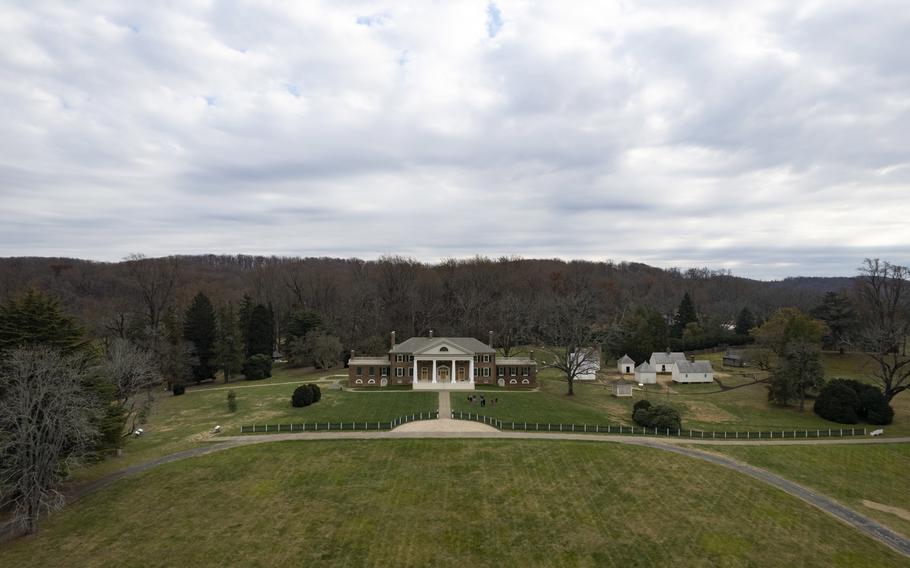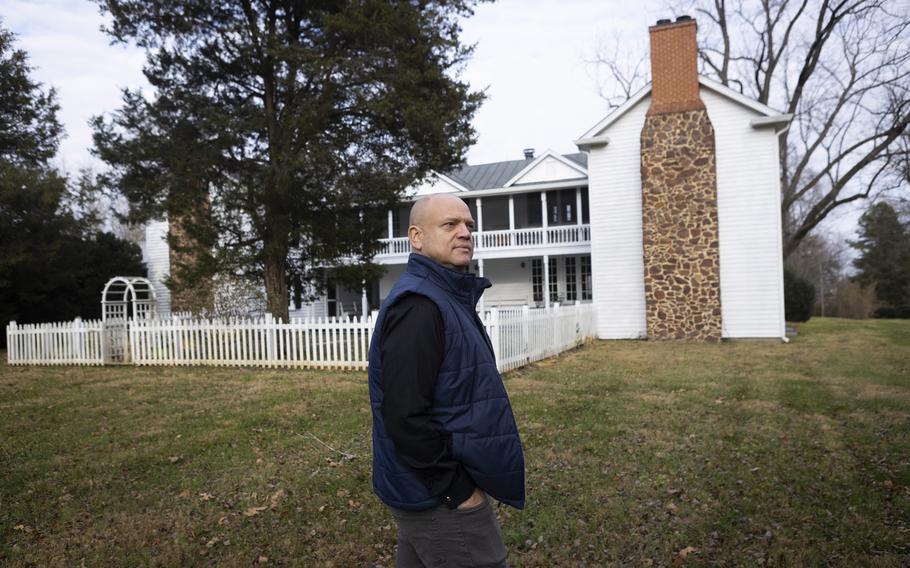
Visitors tour Montpelier, home of America’s fourth president, James Madison, in Orange County, Va. Some descendants of the six generations of people enslaved at the plantation believe the estate’s board isn’t doing enough to achieve racial parity. (Julia Rendleman for The Washington Post )
James Madison's Montpelier estate drew national attention last year when the board that manages the historic Virginia home announced plans to share authority equally with descendants of people who were once enslaved there.
But that unique arrangement appeared in tatters Friday afternoon as the board voted to strip power-sharing status from the Montpelier Descendants Committee, a group representing African Americans who trace their roots to the community.
The vote caps at least two years of rising tensions between the board and the committee, even as Montpelier's reputation has grown as a pioneer in empowering groups who were traditionally marginalized by the telling of history.
"It is a complete reversal of their public commitment that was made on June 16, 2021," said James French, head of the committee and a member of the Montpelier Foundation's board. "It's a rejection of the principle of equality of descendant voices and it's very unfortunate, because it is a missed opportunity for Montpelier to make history."
Five descendants of enslaved people serve on the board, three chosen by the committee and two by the foundation. The change in bylaws approved Friday strips the committee of its ability to name future members, giving the foundation more control over the makeup of the board.
Foundation chairman Gene Hickok said in an interview that the change is not an effort to back away from the commitment to fully represent descendants on the board, a concept called structural parity. Instead, he said, the board has found the committee difficult to work with and wants the ability to choose descendant members from a wider pool.
"This is an effort to reset the process," Hickok said. "It certainly doesn't have the board backing away from parity. We are very committed to parity. The challenge has been organizationally getting there."
The conflict and the proposed bylaws change have outraged many staffers who work at the estate, including curators, historians and archaeologists. They say the committee of descendants has been an integral partner in interpreting the complicated history of Madison, his family and the roughly 300 enslaved people who lived and died there over the span of 140 years.
A majority of the site's roughly 40 full-time employees wrote an unsigned resolution urging the board not to approve the change. "We request" the Montpelier Foundation "respect its well-publicized commitment to immediately implement its bylaws and provide 'at least equal representation' on the board to" the committee, they wrote before the vote.
The employees supplied their names to The Washington Post but most asked that they not be published for fear of retaliation. They called on the foundation to "end the intimidation of staff," which they said included restrictions against contacting members of the descendant community that have made it impossible to complete several costly restoration projects.
On Thursday evening, the head of the National Trust for Historic Preservation, which owns Montpelier, wrote Hickok and urged him "in the strongest possible terms" not to go ahead with changing the bylaws.
"We believe this change would undermine decades of important work that led to the formation of" the committee "in the first place, and in turn would set back Montpelier's efforts to continue the necessary work of uplifting descendants' voices, and repairing the relationship between the broader African American community and Montpelier, the former site of generations of enslavement," trust chief executive Paul Edmondson wrote.
Several staffers and board members say they believe the institution's leaders are not willing to relinquish control over the portrayal of the fourth U.S. president and his legacy as the father of the Constitution.
"After more than twenty years of partnership with descendants, Montpelier staff members have since 2020 been threatened with termination for contacting colleagues and friends in the descendants' community," Elizabeth Chew, Montpelier executive vice president and chief curator, said in an email to The Post. "At the same time, important research and interpretation projects for which we have funding in hand and that depend on the relationship" with the committee "remain on hold."
Matt Reeves, the director of archaeology, who has worked at Montpelier since 2000, said he fears the effort to cut off the committee is aimed at undoing years of progress in conveying a more honest and complete view of history. "They really want a narrative that's restricted to nothing that's negative about James Madison," he said. "What the board is doing is tearing down Montpelier brick by conceptual brick and having one story remain."
Montpelier gained special status in the world of historic preservation when a 2018 conference there on teaching about slavery produced a document widely known as "the rubric." Guided by Michael Blakey, a professor at the College of William & Mary and leader in the effort to involve descendant communities in historic preservation, the document, titled "Engaging Descendant Communities," set standards for guiding institutions toward more complete representation.
Sara Bon Harper, executive director of Highland, the home of former president James Monroe, said she has watched from afar as Montpelier has struggled to live up to its own example. "They've been the leader and I think they will be again. This is a hard time, but they've got a lot of thoughtful people who are really committed to figuring out how to best interpret difficult history that still impacts us," she said.

James French, a descendent of enslaved people, stands in front of his ancestral home in Orange County, Va. He is the head of the Montpelier Descendants Committee and a member of the Montpelier Foundation’s 16-person board. (Julia Rendleman for The Washington Post )
French said tension with the board began brewing after Hickok became chairman in 2019 and hired Roy Young as president in 2020, then broke into the open after George Floyd was killed by Minneapolis police. The Montpelier Foundation issued a statement lamenting Floyd's death, but the descendant committee felt it didn't go far enough in condemning systemic racial inequities and submitted stronger language.
Hickok said he found the language "unduly inflammatory toward James Madison." The committee rejected his edits, he said, so the statement never went out. Another sticking point, French said, was Hickok's insistence on drawing up a memo of understanding to govern the committee's interactions with the foundation board.
"They were essentially calling us outside agitators, instead of the descendants of the people buried in the fields," French said. "We always insisted our legitimacy should be, to any fair-minded person, self-evident, and not a matter of regulatory debate."
Hickok said the committee has resisted basic efforts to structure its relationship with the board. "I just think it's the dynamics of two organizations that are trying to chart a path through relatively new and difficult waters that are somewhat wary of each other, and that makes it difficult to develop the kind of spirit and trust that are essential in any kind of partnership," he said.
Hickok said his proposal to change the bylaws to remove the committee as the sole official representative of the descendant community was an effort to break the impasse. There are other descendants who are not affiliated with the committee, he said, and the board needs the authority to control its own membership.
"We're very, very committed to telling the whole story of Montpelier. It is as much a story of the slaves as it is James and Dolley Madison," Hickok said. "We are not backing at all away from that commitment to the whole truth."
But to French and other committee members, the effort is an attempt to maintain control over the descendant community. The struggle at Montpelier is not only what history to tell its visitors, but who should do the telling, said Bettye Kearse, a board member who was put forward by the committee.
The board "wants to continue telling the public a whitewashed narrative about the Constitution and its chief architect and deciding what should be said about the 300 people Madison owned," Kearse said in an email.
Edmondson cast the dilemma starkly in his letter to Hickok. The descendants chose the committee as their formal voice, he said, and the original commitment to give them equal seats on the board "acknowledged the right of the descendant community to define itself, rather than to be defined by the foundation. The newly proposed revisions to the bylaws would do the opposite."
Greg Werkheiser, a lawyer for the committee, said he tried to broker a truce, submitting a list of 40 names of prospective board members backed by the committee, but the foundation declined. It wasn't the first time negotiations broke down. Outside mediators brought in last year eventually quit, criticizing the foundation for taking actions "entirely inconsistent" with a commitment to seek board parity in a letter obtained by The Post.
Hickok acknowledged the board's actions could be interpreted as cutting off the descendant committee but said that's the opposite of his intentions. "The goal here is to work together. That's the whole point. It's not supposed to be we versus you," he said.